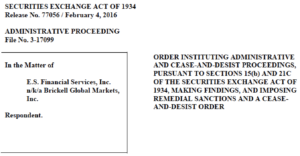Types Of SEC Cases: Anti-Money Laundering
SEC Fines Miami Broker-Dealer For Violating Anti-Money Laundering Regulations
The U.S. Securities and Exchange Commission (“SEC”) announced that it reached a settlement agreement in an Administrative Proceeding brought against E.S. Financial Services, Inc. (“ES”), a Miami-based broker-dealer, for willfully ignoring anti-money laundering (“AML”) procedures under the Bank Secrecy Act and the SEC’s rules, such as reporting, recordkeeping and record retention requirements.Undocumented Customers
In its Order, the SEC accused ES of knowingly choosing not to comply with anti-money laundering requirements.
The SEC Order
Anti-Money Laundering Violations
During the period in question, ES maintained a Customer Identification Program (“CIP”), as required under the Bank Secrecy Act and the SEC’s CIP rules. Those procedures required the collection and verification of specific information pertaining to the account holders of all customer brokerage accounts. Included in these requirements was a Know Your Customer form that was required to contain comprehensive information, including the disclosure of all principals and any beneficial owners associated with the respective brokerage account. According to the SEC, other than tax identification documentation, ES neglected to obtain any customer information on the Bank. ES also allegedly failed to obtain and verify the required information for the 13 entities or the 23 individuals. Furthermore, in response to two different requests by the SEC to provide documents to identify all customers, ES failed to produce account and other associated information to identify the related entities and individuals.
The SEC’s press release
While no fraud occurred in this instance, our investigation found there were significant holes in the framework of E.S. Financialʼs CIP that left the firm susceptible to illegal activity by customers who were not fully known … Firms must stick to the CIP rules that require a broker-dealer to establish, document, and maintain procedures for identifying all customers and verifying their identities.
Penalties For The Anti-Money Laundering Violations
The SEC censured ES and ordered it to cease and desist from future anti-money laundering violations. In addition, ES agreed to pay a $1 million penalty, and to retain an independent monitor to directly review its anti-money laundering/CIP policies, procedures, and practices for two years.Whistleblowers Can Report Anti-Money Laundering Violations To The SEC
This case illustrates some types of misconduct that could give rise to SEC whistleblower cases if reported to the Commission through the SEC whistleblower program. However, the SEC has not made any public statement as to whether this case was itself an actual SEC whistleblower case. The SEC Office of the Whistleblower posts Notices of Covered Action (“NoCA”) for Commission actions where a final judgment or order results in monetary sanctions exceeding $1 million. The NoCA list does not disclose if a particular Enforcement action was brought as the result of an SEC whistleblower case, tip, complaint, or referral being filed with the Commission.Additional Information
For more information about the SEC’s enforcement of anti-money laundering regulations, click on the links below:- The SEC’s Order in SEC v. E.S. Financial Services Inc. (External link to the SEC’s website.)
- The SEC’s Press Release announcing the settlement. (External link to the SEC’s website.)







